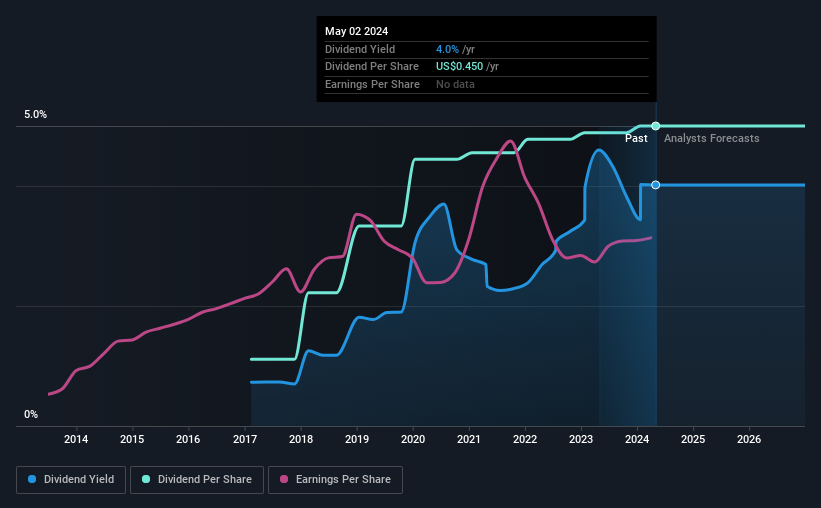Income Investors Should Know That Colony Bankcorp, Inc. (NASDAQ:CBAN) Goes Ex-Dividend Soon
It looks like Colony Bankcorp, Inc. (NASDAQ:CBAN) is about to go ex-dividend in the next three days. The ex-dividend date is one business day before a company's record date, which is the date on which the company determines which shareholders are entitled to receive a dividend. The ex-dividend date is of consequence because whenever a stock is bought or sold, the trade takes at least two business day to settle. Thus, you can purchase Colony Bankcorp's shares before the 7th of May in order to receive the dividend, which the company will pay on the 22nd of May.
The company's next dividend payment will be US$0.1125 per share, and in the last 12 months, the company paid a total of US$0.45 per share. Based on the last year's worth of payments, Colony Bankcorp stock has a trailing yield of around 4.0% on the current share price of US$11.20. Dividends are an important source of income to many shareholders, but the health of the business is crucial to maintaining those dividends. As a result, readers should always check whether Colony Bankcorp has been able to grow its dividends, or if the dividend might be cut.
Check out our latest analysis for Colony Bankcorp
Dividends are typically paid from company earnings. If a company pays more in dividends than it earned in profit, then the dividend could be unsustainable. Fortunately Colony Bankcorp's payout ratio is modest, at just 35% of profit.
When a company paid out less in dividends than it earned in profit, this generally suggests its dividend is affordable. The lower the % of its profit that it pays out, the greater the margin of safety for the dividend if the business enters a downturn.
Click here to see the company's payout ratio, plus analyst estimates of its future dividends.
Have Earnings And Dividends Been Growing?
When earnings decline, dividend companies become much harder to analyse and own safely. If business enters a downturn and the dividend is cut, the company could see its value fall precipitously. So we're not too excited that Colony Bankcorp's earnings are down 2.3% a year over the past five years.
Many investors will assess a company's dividend performance by evaluating how much the dividend payments have changed over time. Colony Bankcorp has delivered 24% dividend growth per year on average over the past seven years.
The Bottom Line
Is Colony Bankcorp an attractive dividend stock, or better left on the shelf? Earnings per share have shrunk noticeably in recent years, although we like that the company has a low payout ratio. This could suggest a cut to the dividend may not be a major risk in the near future. It might be worth researching if the company is reinvesting in growth projects that could grow earnings and dividends in the future, but for now we're on the fence about its dividend prospects.
With that being said, if dividends aren't your biggest concern with Colony Bankcorp, you should know about the other risks facing this business. In terms of investment risks, we've identified 1 warning sign with Colony Bankcorp and understanding them should be part of your investment process.
Generally, we wouldn't recommend just buying the first dividend stock you see. Here's a curated list of interesting stocks that are strong dividend payers.
Have feedback on this article? Concerned about the content? Get in touch with us directly. Alternatively, email editorial-team (at) simplywallst.com.
This article by Simply Wall St is general in nature. We provide commentary based on historical data and analyst forecasts only using an unbiased methodology and our articles are not intended to be financial advice. It does not constitute a recommendation to buy or sell any stock, and does not take account of your objectives, or your financial situation. We aim to bring you long-term focused analysis driven by fundamental data. Note that our analysis may not factor in the latest price-sensitive company announcements or qualitative material. Simply Wall St has no position in any stocks mentioned.

 Yahoo Finance
Yahoo Finance 
